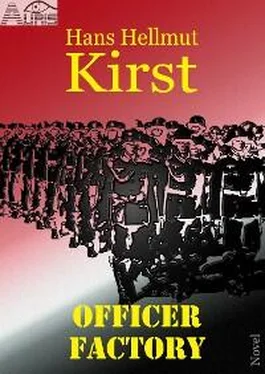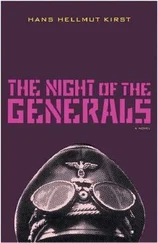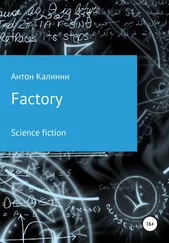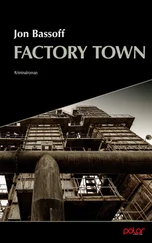Captain Kater was walking restlessly up and down among the tombstones like a cat on hot bricks. He was trying to think how he could get on top of the situation. He felt almost inclined to appeal to heaven, and indeed to that very department which concerned itself with the affairs of the padre's particular faith. But he soon abandoned all hope that the Lord Himself would set His servant's ankle to rights in time.
He kept gazing longingly at the entrance to the cemetery. Finally he asked Lieutenant Krafft: “Do you think there's any chance of the padre turning up in time?"
“Not much," said Krafft amiably.
“But what the hell are we doing here, then?" cried Kater in desperation.
“Well, my dear fellow," said Captain Feders, “you have, as always, a number of alternatives open to you! For example you can extend the break. Or you can postpone the funeral. Or you can find a substitute for the padre. Or you can tell the General that you have nothing to tell him. On the other hand, you can quite simply drop dead, and thus be rid of all your troubles."
Kater looked about him savagely like a wild boar at bay. The officers regarded him with considerable interest; after what had happened here at the cemetery, he no longer seemed such a formidable figure. Lieutenant Krafft, it seemed to them, had maneuvered Kater into a position from which he would find it difficult to emerge unscathed. Presumably Krafft was after his job. After all, this was the way things usually worked; one man profited from another's mistakes.
But an expectant hush suddenly settled over the mourners. For Major-General Modersohn had turned back towards the funeral party, letting his shark's eyes sweep over them until complete silence reigned. Then he stared straight at Captain Kater.
“Break over!" cried the latter immediately.
The General nodded almost imperceptibly. The officers fell in again and the cadets froze in their positions. Otherwise at first nothing else happened at all.
A silence which was not indeed without a certain solemnity now settled over the funeral party. Only Captain Kater could be heard, breathing heavily beside Lieutenant Krafft.
“For God's sake, then!" said the General.
Kater started with dismay. The ceremony was his responsibility but he couldn't think what should be done with it. Feeling increasingly inclined to hand the solution of this problem over to Krafft, he turned on him a look at once peremptory and imploring. “Carry on then, Krafft!" he whispered, and as if to give further emphasis to the order, for there could be no doubt that this was what it was, he pushed Krafft to the fore.
Once again Krafft almost stumbled into the open grave. But he pulled himself up just in time, and said to the cadets stationed beside the coffin: “Let him down!"
The cadets immediately obeyed. The coffin rattled down into the grave, and frozen earth fell on top of it, while those present followed this utterly unexpected turn of events with mixed feelings.
“We will now join in silent prayer," proposed Lieutenant Krafft. Fortunately this rather vague formula had the suggestion of an order about it. And the mourners seemed to adapt themselves to the proposal at once. They lowered their heads, stared at the ground, and tried to maintain suitably solemn expressions.
Hardly any of the officers thought for a moment about Lieutenant Barkow lying in the now almost invisible coffin, for few of them had ever seen much of him. Lieutenant Barkow, like many of the instructors, had only been at the school a fortnight. He had been an erect, rather aloof figure, with an expressionless youthful face, fishy eyes, and a mouth that was always tight shut. An officer of the sort you find in picture books: the faithful youth of Germany—resolute, prepared for anything. Even for this. What could be more logical?
One of the cadets muttered: “He asked for it anyway." From a distance at any rate, it sounded almost like a prayer. “Amen," said Lieutenant Krafft loudly.
“Dismiss!" said Major-General Modersohn.
This order of the General's caught everyone completely by surprise. It was like a pistol shot fired at point-blank range. The mourners looked up, some rather put-out, others genuinely disturbed. The order was not without its resemblance to an unexpected kick in the pants. Moreover it was issued to people who were ostensibly saying their prayers.
Only slowly did the utterly unheard-of nature of the order begin to dawn on the more experienced members of the funeral party—it was an order directed against the ceremony itself. For the earth had not been thrown in, the wreaths had not been laid, and the volley had not been fired over the grave. The procedure which had been so carefully planned and rehearsed four times had been abruptly broken off at a single word.
A word, however, to which there was no gainsaying.
"The officers are dismissed." As second-in-command, the officer in command of Number 1 Course gave the order without delay. It was a good chance to display initiative. It would not escape the General's attention, for initiative was something to which he attached particular importance. “Cadets will return to their billets. Further duty as per time-table."
The funeral party broke up almost at once. The officers moved off in ones and twos towards the entrance to the cemetery. Captain Ratshelm immediately took over command of his company.
Captain Kater stood there for a few seconds rooted to the spot. Then he moved off in the wake of Lieutenant Krafft for whom he was planning a massive rebuke. For how was Kater to continue to exist in this training school if he couldn't find a scapegoat? He had never failed to find one before.
Major-General Modersohn alone remained behind.
The General took a few paces forward and stared into the grave. He saw the dark brown wooden planks on to which the earth had fallen. All round him lay dirty, trampled snow. Somebody's heel had ground a scarlet wreath ribbon into the slush. It lay there encrusted with mud.
The hard, inscrutable face of the General gave nothing away. His lips were set in a thin, straight line. And his eyes were closed, or so it seemed. As if he wanted no one to see what he was thinking.
As the officers and cadets marched down into the valley towards their barracks they looked back from the great bend in the road and saw their commanding officer still standing in the cemetery in the distance — a clear, slim silhouette, menacing against the ice-cold, snow-blue sky, as if frozen in his unapproachability.
“There’s going to be a damned cold wind blowing in the next few days," said Captain Feders. “Because, I don't care what anyone says, there's something odd about this whole business. The General isn't the sort of man to mind about ordinary, everyday stupidity. If he shows he's angry, then it means that some really gigantic row is brewing. But what, exactly? Well, we'll be finding out all too soon."
“My dear Lieutenant Krafft," said Captain Kater, who was making his way through the barracks with his company officer towards the headquarters building, “a training school is a highly complex organization. And compared with our General the Sybil herself was little more than a slick fortune-teller."
Читать дальше












